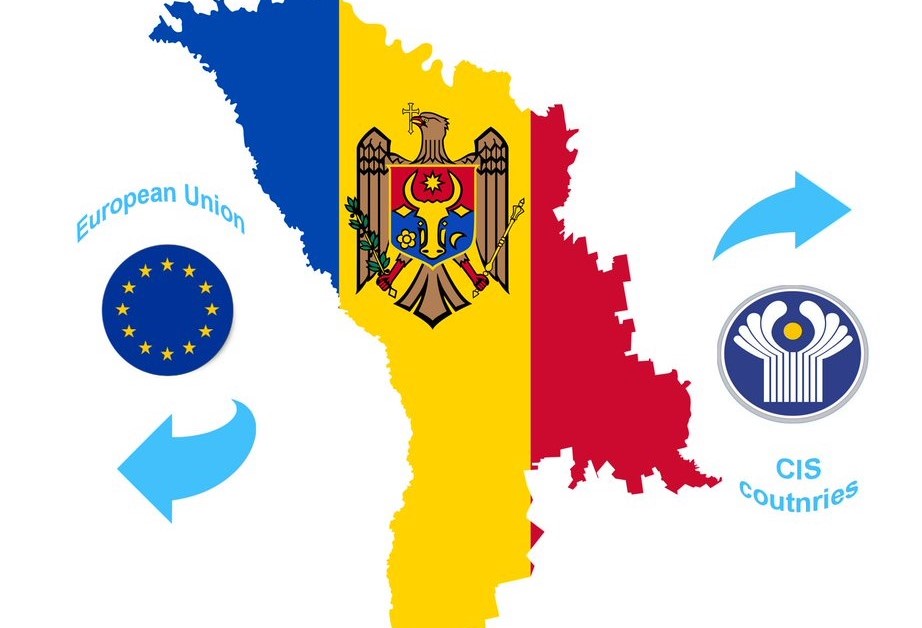
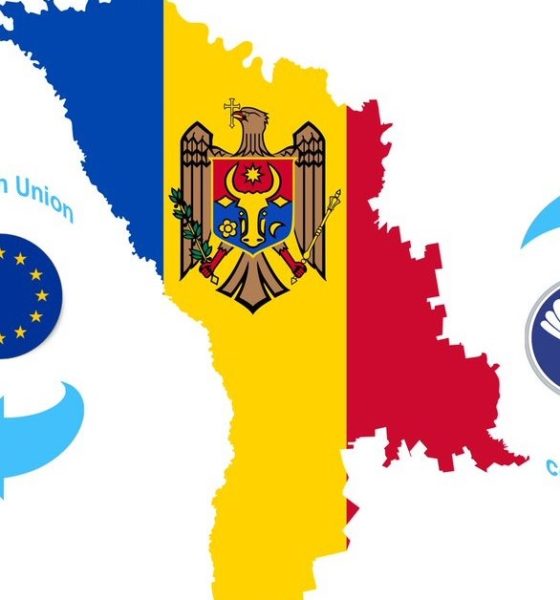
Economy
East vs. West// The exports of the Republic of Moldova to the CIS and the EU countries – a comparative analysis
The Republic of Moldova is a former soviet country, having tight commercial relationships established with all countries forming the Commonwealth of Independent States (CIS) – a regional intergovernmental organisation of ten post-Soviet republics in Europe and Asia, that formed after the dissolution of the Soviet Union in 1991.
On the other hand, Moldova signed the Association Agreement with the European Union in June 2014 and has benefited from a preferential trade within the Deep and Comprehensive Free Trade Area (DCFTA) with the EU, that meaning reduced or eliminated tariffs for goods, increased services market and better investment conditions, as the official website of the European Commission states.
Statistical data and newly signed trade agreements are often publicly mentioned when wishing to emphasise one or another relationship as the most strategic one for the Republic of Moldova. But how is it in reality?
Moldova and the EU
On December 19th, 2019, the Council of the EU has formally endorsed an agreement granting Moldovan farmers and SMEs additional preferential export opportunities to the EU, following the agreement signed between the EU and the previous government led by Maia Sandu, to broaden the degree of trade liberalisation for specific agricultural products under the DCFTA, according to a statement of the European Commission.
The agreement provided that the Republic of Moldova will be granted additional duty-free tariff rate quotas to export table grapes (of double the current amount) and plums (of a 50% increase on the current volume), as well as a new duty-free quota for cherries (of 1.500 tonnes). The EU exporters will also gain additional duty-free access to the Moldovan market.
Moreover, the thresholds triggering the anti-circumvention mechanism (a mechanism that provides for the possibility of reintroducing the customs duty when imports of certain agricultural products and processed agricultural products exceed a given threshold) for wheat, barley, maize, sugar and processed cereals have also been raised, taking into account the trade patterns over the last few years.
Generally, the Association Agreement between the EU and the Republic of Moldova provides Moldova with a framework for boosting trade and economic growth through improved access to the EU market and mechanisms for aligning its trade-related laws and regulations to EU’s standards.
According to the official statistics of the European Commission, the Moldova’s exports to the EU grew by 62% between 2014 and 2018. Between 2017 and 2018, it increased by 16%, from €1.6 billion to €1.9 billion.
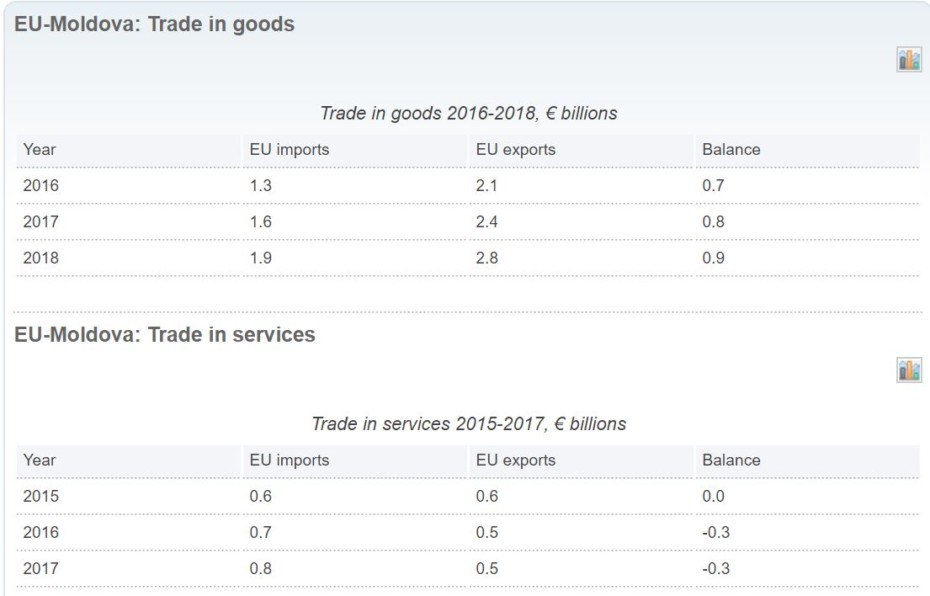
source: ec.europa.eu
The European Union is Moldova’s biggest trade partner, as around 70% of its exports are sent to the EU, followed by Russia (8%) and Belarus (3%). Key EU imports from Moldova are mainly machinery and appliances, vegetable products, textiles and textile articles and base metals.
Moldova and the CIS
Russia is one of the most important eastern partners for the Republic of Moldova. Usually, the good news about the export of Moldovan products to this country come from the president of the Republic of Moldova, Igor Dodon. This December, he already made 2 announcements regarding the extension of fruit and vegetable exporters’ list who are allowed to export on the Russian market starting the next year. First, the list was extended from 130 to over 350 Moldovan companies, and then 150-200 other companies obtained such permission recently.
“It was agreed to extend the list of categories of goods that are exported to the Russian market without customs duties for another five product categories: beef, sunflower seeds, sugar, ethyl alcohol and furniture from January 1st, 2020. I mention that so far the export taxes for five categories have been excluded: vegetables; apples, pears and fresh quinces; apricots, cherries and sour cherries; canned vegetables; wines,” informed Dodon on his Facebook page.
Additionally, the Minister of Agriculture asked the Russian profile institutions to inspect 33 wineries and four canning companies from Moldova, in order to grant them access to the Russian market. All in all, the Russian Federation will issue 16,000 transport authorisations for Moldovan carriers in the next year.
A prohibition of export for Moldovan companies was set up after a decision of the Government of the Russian Federation, on December 29th, 2018, which forbid to import Ukrainian products and products transiting Ukraine, including those from Moldova.
At the begging of 2019, Russian customs authorities forbid to import large quantities of goods produced in the Republic of Moldova and the Transnistrian region.
The Russian portal Regnum.ru was writing, at that time, that the majority of Moldovan exporting companies affected by the Russian Government decision are precisely those for which, in the following half of 2019, Russia cancelled the import duties, such as producers of fresh and preserved fruits and vegetables, as well as wine products. According to the Russian publication, the measure to support Moldovan businesses was an act of political support of the Moldovan president, Igor Dodon, in the upcoming parliamentary elections, which became possible after a meeting between Dodon and the Russian president.
Nowadays, more and more companies from Moldova are granted gradually back access to the Russian market, President Dodon announcing that every time on his page or at press conferences. Let’s not forget that Moldova expects new presidential elections in 2020.
All in all, the statistics of the CIS presented a total export value of $416 million in 2018, as compared to $463 million in 2017. From January to September 2019, Moldova’s exports to CIS countries amounted $301.8 million, that decreasing by 1.6% as compared to the same period in 2018.
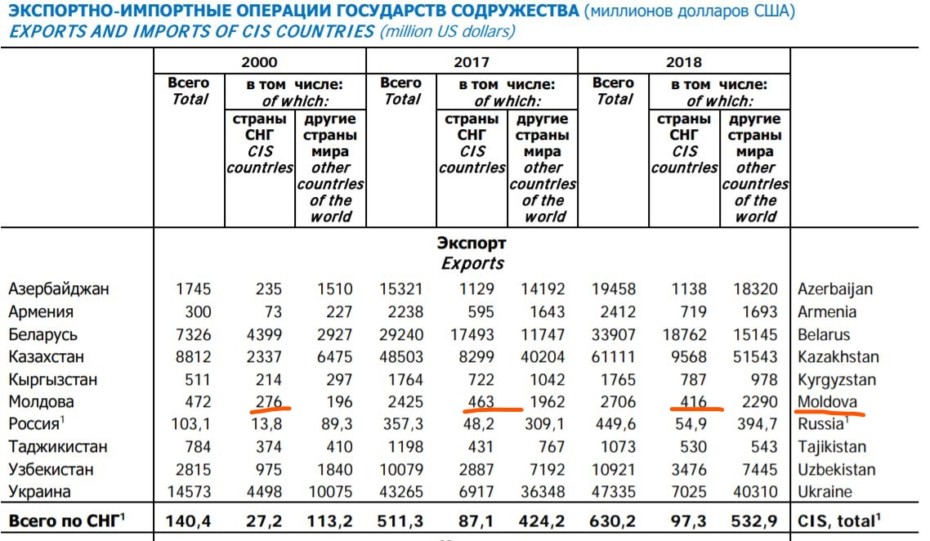
source: cisstat.com
National statistics
When looking at the whole picture, it can be observed that in 2006, the Moldovan exports to the EU countries exceeded for the first time the exports to the CIS countries, the difference between the exports to the two destinations starting to be bigger and bigger, as the National Bureau of Statistics of Moldova (NBS) displays.
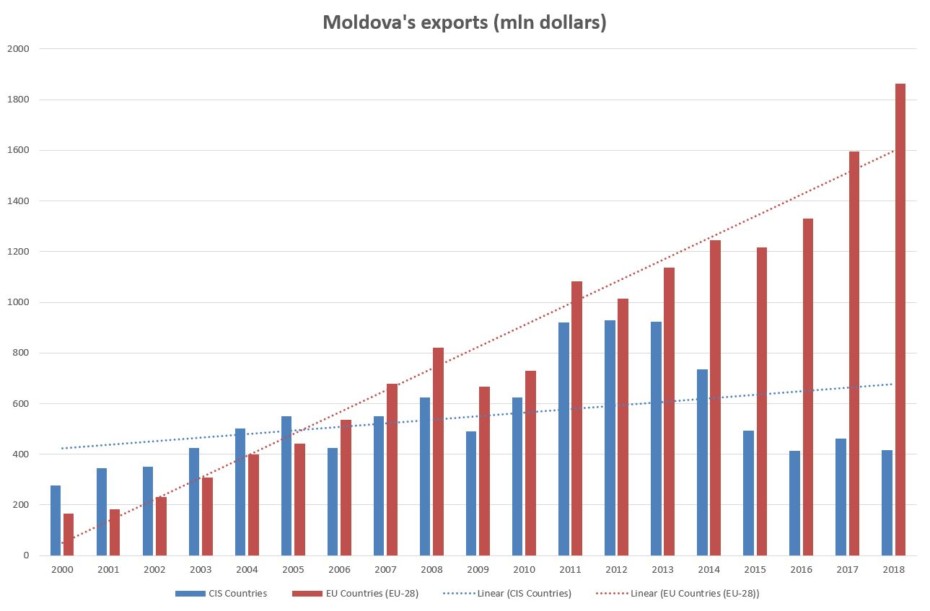
Data source: statbank.statistica.md
Still, the most important trading partners for Moldova remained such European countries as Romania – 42.54% ($ 792.137 million) of the total exports to the EU countries, Italy – 16,62% ($ 309.606 million) of the total exports to the EU countries and Germany – 11.81% ($ 219.902 million) of the total exports to the EU countries, as well as such CIS countries as Russia, the exports to which represented 52.55% ($ 218.571 million) of the total volume of exports to the CIS countries in 2018.
Photo: statistica.gov.md
Society
“They are not needy, but they need help”. How Moldovan volunteers try to create a safe environment for the Ukrainian refugees

At the Government’s ground floor, the phones ring constantly, the laptop screens never reach standby. In one corner of the room there is a logistics planning meeting, someone has a call on Zoom with partners and donors, someone else finally managed to take a cookie and make some coffee. Everyone is exhausted and have sleepy red eyes, but the volunteers still have a lot of energy and dedication to help in creating a safe place for the Ukrainian refugees.
“It’s like a continuous bustle just so you won’t read the news. You get home sometimes and you don’t have time for news, and that somehow helps. It’s a kind of solidarity and mutual support,” says Vlada Ciobanu, volunteer responsible for communication and fundraising.
The volunteers group was formed from the very first day of war. A Facebook page was created, where all types of messages immediately started to flow: “I offer accommodation”, “I want to help”, “I want to get involved”, “Where can I bring the products?”, “I have a car and I can go to the customs”. Soon, the authorities also started asking for volunteers’ support. Now they all work together, coordinate activities and try to find solutions to the most difficult problems.
Is accommodation needed for 10, 200 or 800 people? Do you need transportation to the customs? Does anyone want to deliver 3 tons of apples and does not know where? Do you need medicine or mobile toilets? All these questions require prompt answers and actions. Blankets, sheets, diapers, hygiene products, food, clothes – people bring everything, and someone needs to quickly find ways of delivering them to those who need them.
Sometimes this collaboration is difficult, involves a lot of bureaucracy, and it can be difficult to get answers on time. “Republic of Moldova has never faced such a large influx of refugees and, probably because nobody thought this could happen, a mechanism of this kind of crisis has not been developed. Due to the absence of such a mechanism that the state should have created, we, the volunteers, intervened and tried to help in a practical way for the spontaneous and on the sport solutions of the problems,” mentions Ecaterina Luțișina, volunteer responsible for the refugees’ accommodation.
Ana Maria Popa, one of the founders of the group “Help Ukrainians in Moldova/SOS Українці Молдовa” says that the toughest thing is to find time and have a clear mind in managing different procedures, although things still happen somehow naturally. Everyone is ready to intervene and help, to take on more responsibilities and to act immediately when needed. The biggest challenges arise when it is necessary to accommodate large families, people with special needs, for which alternative solutions must be identified.
Goods and donations
The volunteers try to cope with the high flow of requests for both accommodation and products of all kinds. “It came to me as a shock and a panic when I found out that both mothers who are now in Ukraine, as well as those who found refuge in our country are losing their milk because of stress. We are trying to fill an enormous need for milk powder, for which the demand is high and the stocks are decreasing”, says Steliana, the volunteer responsible for the distribution of goods from the donation centers.
Several centers have been set up to collect donations in all regions of Chisinau, and volunteers are redirecting the goods to where the refugees are. A system for processing and monitoring donations has already been established, while the volunteer drivers take over the order only according to a unique code.
Volunteers from the collection centers also do the inventory – the donated goods and the distributed goods. The rest is transported to Vatra deposit, from where it is distributed to the placement centers where more than 50 refugees are housed.
When they want to donate goods, but they don’t know what would be needed, people are urged to put themselves in the position of refugees and ask themselves what would they need most if they wake up overnight and have to hurriedly pack their bags and run away. Steliana wants to emphasise that “these people are not needy, but these people need help. They did not choose to end up in this situation.”
Furthermore, the volunteer Cristina Sîrbu seeks to identify producers and negotiate prices for products needed by refugees, thus mediating the procurement process for NGOs with which she collaborates, such as Caritas, World Children’s Fund, Polish Solidarity Fund, Lifting hands, Peace Corps and others.
One of the challenges she is facing now is the identifying a mattress manufacturer in the West, because the Moldovan mattress manufacturer that has been helping so far no longer has polyurethane, a raw material usually imported from Russia and Ukraine.
Cristina also needs to find solutions for the needs of the volunteer groups – phones, laptops, gsm connection and internet for a good carrying out of activities.
Hate messages
The most difficult thing for the communication team is to manage the hate messages on the social networks, which started to appear more often. “Even if there is some sort of dissatisfaction from the Ukrainian refugees and those who offer help, we live now in a very diverse society, there are different kind of people, and we act very differently under stress,” said Vlada Ciobanu.
Translation by Cătălina Bîrsanu
Featured
FC Sheriff Tiraspol victory: can national pride go hand in hand with political separatism?

A new football club has earned a leading place in the UEFA Champions League groups and starred in the headlines of worldwide football news yesterday. The Football Club Sheriff Tiraspol claimed a win with the score 2-1 against Real Madrid on the Santiago Bernabeu Stadium in Madrid. That made Sheriff Tiraspol the leader in Group D of the Champions League, including the football club in the groups of the most important European interclub competition for the first time ever.
International media outlets called it a miracle, a shock and a historic event, while strongly emphasizing the origin of the team and the existing political conflict between the two banks of the Dniester. “Football club from a pro-Russian separatist enclave in Moldova pulls off one of the greatest upsets in Champions League history,” claimed the news portals. “Sheriff crushed Real!” they said.
Moldovans made a big fuss out of it on social media, splitting into two groups: those who praised the team and the Republic of Moldova for making history and those who declared that the football club and their merits belong to Transnistria – a problematic breakaway region that claims to be a separate country.
Both groups are right and not right at the same time, as there is a bunch of ethical, political, social and practical matters that need to be considered.
Is it Moldova?
First of all, every Moldovan either from the right or left bank of Dniester (Transnistria) is free to identify himself with this achievement or not to do so, said Vitalie Spranceana, a sociologist, blogger, journalist and urban activist. According to him, boycotting the football club for being a separatist team is wrong.
At the same time, “it’s an illusion to think that territory matters when it comes to football clubs,” Spranceana claimed. “Big teams, the ones included in the Champions League, have long lost their connection both with the countries in which they operate, and with the cities in which they appeared and to which they linked their history. […] In the age of globalized commercial football, teams, including the so-called local ones, are nothing more than global traveling commercial circuses, incidentally linked to cities, but more closely linked to all sorts of dirty, semi-dirty and cleaner cash flows.”
What is more important in this case is the consistency, not so much of citizens, as of politicians from the government who have “no right to celebrate the success of separatism,” as they represent “the national interests, not the personal or collective pleasures of certain segments of the population,” believes the political expert Dionis Cenusa. The victory of FC Sheriff encourages Transnistrian separatism, which receives validation now, he also stated.
“I don’t know how it happens that the “proud Moldovans who chose democracy”, in their enthusiasm for Sheriff Tiraspol’s victory over Real Madrid, forget the need for total and unconditional withdrawal of Russian troops from Transnistria!” declared the journalist Vitalie Ciobanu.
Nowadays, FC Sheriff Tiraspol has no other choice than to represent Moldova internationally. For many years, the team used the Moldovan Football Federation in order to be able to participate in championships, including international ones. That is because the region remains unrecognised by the international community. However, the club’s victory is presented as that of Transnistria within the region, without any reference to the Republic of Moldova, its separatist character being applied in this case especially.
Is it a victory?
In fact, FC Sheriff Tiraspol joining the Champions League is a huge image breakthrough for the Transnistrian region, as the journalist Madalin Necsutu claimed. It is the success of the Tiraspol Club oligarchic patrons. From the practical point of view, FC Sheriff Tiraspol is a sports entity that serves its own interests and the interests of its owners, being dependent on the money invested by Tiraspol (but not only) oligarchs.
Here comes the real dilemma: the Transnistrian team, which is generously funded by money received from corruption schemes and money laundering, is waging an unequal fight with the rest of the Moldovan football clubs, the journalist also declared. The Tiraspol team is about to raise 15.6 million euro for reaching the Champions League groups and the amounts increase depending on their future performance. According to Necsutu, these money will go directly on the account of the club, not to the Moldovan Football Federation, creating an even bigger gab between FC Sheriff and other football clubs from Moldova who have much more modest financial possibilities.
“I do not see anything useful for Moldovan football, not a single Moldovan player is part of FC Sheriff Tiraspol. I do not see anything beneficial for the Moldovan Football Federation or any national team.”
Is it only about football?
FC Sheriff Tiraspol, with a total estimated value of 12.8 million euros, is controlled by Victor Gusan and Ilya Kazmala, being part of Sheriff Holding – a company that controls the trade of wholesale, retail food, fuels and medicine by having monopolies on these markets in Transnistria. The holding carries out car trading activities, but also operates in the field of construction and real estate. Gusan’s people also hold all of the main leadership offices in the breakaway region, from Parliament to the Prime Minister’s seat or the Presidency.
The football club is supported by a holding alleged of smuggling, corruption, money laundering and organised crime. Moldovan media outlets published investigations about the signals regarding the Sheriff’s holding involvement in the vote mobilization and remuneration of citizens on the left bank of the Dniester who participated in the snap parliamentary elections this summer and who were eager to vote for the pro-Russian socialist-communist bloc.
Considering the above, there is a great probability that the Republic of Moldova will still be represented by a football club that is not identified as being Moldovan, being funded from obscure money, growing in power and promoting the Transnistrian conflict in the future as well.
Photo: unknown
Elections
Russia’s legislative elections: Why are there 27 polling stations in Transnistria?
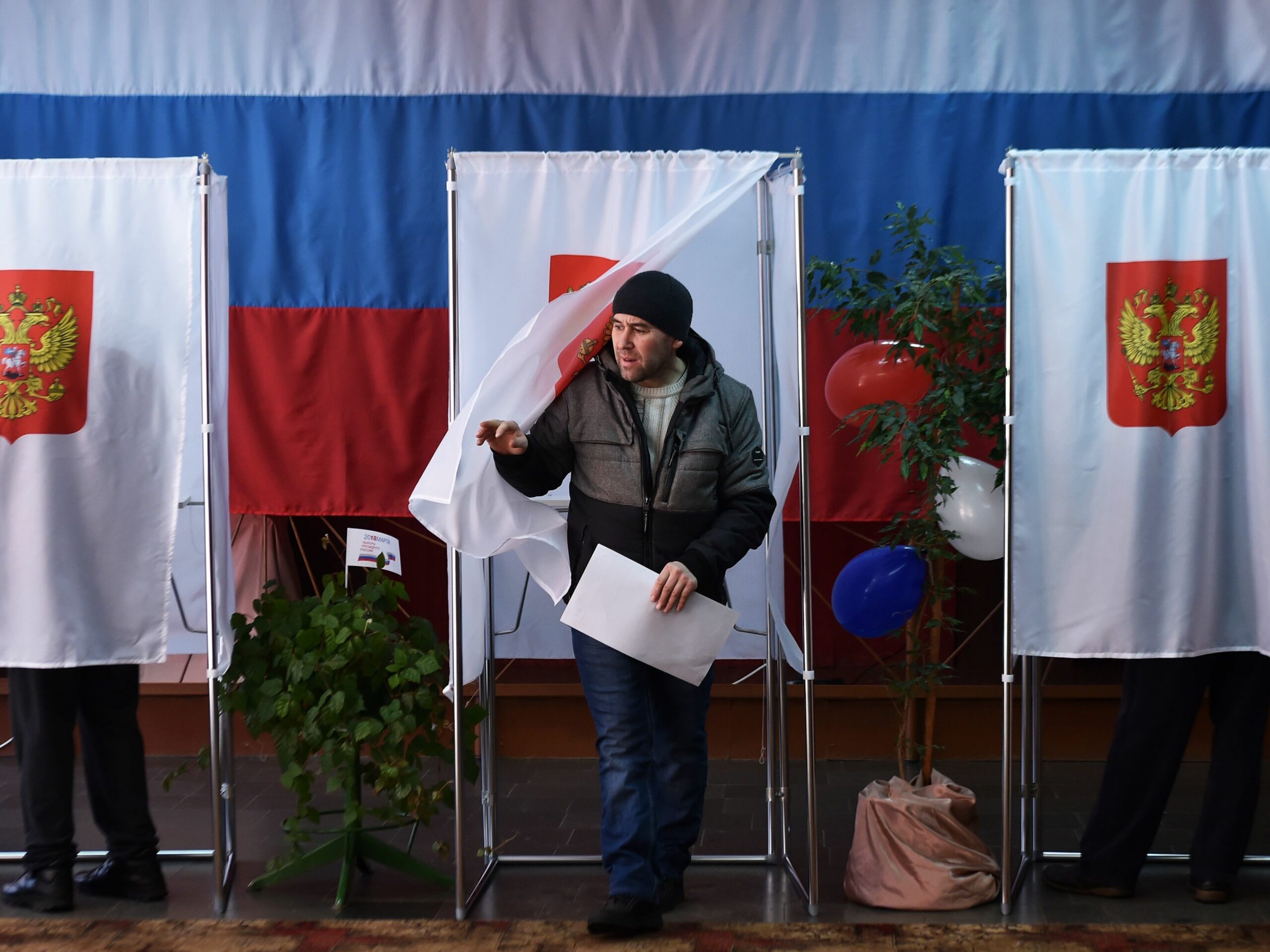
Legislative elections are currently being held in Russia between September 17-19, as 450 new members in the State Duma need to be elected.
The Central Election Commission (CEC) of the Russian Federation decided to open a record number of polling stations in the Transnistrian region – 27 polling stations, in addition to only 3 polling station opened on the right bank of the Dniester in such big cities as Chisinau, Comrat and Balti.
That is the largest number of polling stations opened by the Russian CEC in a foreign country, and five polling stations more than in the 2016 elections. Two of the polling stations were established in Tiraspol, being open from Friday to Sunday. The rest of the Russian polling stations on the Transnistrian territory are opened on Sunday only. The most astonishing fact is that no state other than Russia has ever opened polling stations in the separatist region of the Republic of Moldova. Actually, no polling stations are being opened on the Transnistrian territory when it comes to national elections of the Republic of Moldova either.
Therefore, one could say that the stakes are high when it comes to Transnistrian voters, especially since, most likely, the hopes of Russian authorities are not necessarily based on a large turnout and their real support, rather on the real possibility of electoral fraud on a territory that is not controlled by the constitutional authorities in Chisinau.
Before the presidential elections in 2018, Russian authorities announced that there are 220 thousand Russian citizens living in the Transnistrian region. That time, 24 polling stations were opened in the separatist area. Despite the fact that the Tiraspol Electoral Commission announced that, in the last year and a half alone, the voter turnout has officially fallen in the region by more than 7 700 people, the Russian CEC still decided to establish a record number of polling stations this year, which strengthened the argument about the possibility of election fraud.
Both Tiraspol’s administration and the regional media campaigned for the ruling political party United Russia and called for a high turnout at polling stations. Transnistria’s leader, Vadim Krasnoselski, urged the people on the left bank of the Dniester to come to the polls “because despite all the difficulties, Russia does not forget Transnistria and helps it as much as possible.”
It seems that the campaigning, along with the Russian sponsorship in the region, show great results during every election ballot, as Russian citizens voting in Russian elections in Transnistria are a more active electorate than Moldovan citizens residing in Transnistria and voting in the Moldovan elections at the polling stations arranged on the other bank of the Dniester, especially for them. In the previous Russia’s legislative elections, 56 thousand people voted in Transnistria, while just under 29 thousand inhabitants of the Transnistrian region voted in the recent Moldova’s parliamentary elections.
Before every election ballot held in the Russian Federation, Moldovan authorities make statements, suggesting the Russian side to abstain from opening polling stations in Transnistria, whereas Russian authorities ignore them every time.
This year, the Ministry of Foreign Affairs and European Integration of the Republic of Moldova also sent a note of protest against opening the polling stations in Transnistria. “The Ministry of Foreign Affairs and European Integration regrets that, despite the position consistently expressed by the Moldovan authorities, the Russian side acted in a manner that does not correspond to the principle of sovereignty and territorial integrity of the Republic of Moldova and the bilateral legal framework.”
The Ministry representatives noted that Russian authorities were informed of the lack of impediments to open polling stations in localities under the control of Moldova’s constitutional authorities and requested the Russian side to refrain from opening the 27 polling stations in the localities of the breakaway region, given the impossibility of ensuring the necessary security conditions for the current elections.
Moscow’s Central Election Commission also opened nine polling stations in Abkhazia and ten in South Ossetia – two disputed territories that were internationally recognised by Russia and a few more countries, while considered under military occupation, according to the Georgian Government. These lands, that are under the exclusive control of Russia, offer good opportunities to ‘correct’ any uncomfortable results obtained in the country, where the ruling political party no longer enjoys as much support as it wants to appear.
Photo: wjct.org

























